A Force for Change
With the world still in the grip of the COVID-19 pandemic, the arrival of 2021 brought with it continuing and fresh challenges; challenges that, if they were to be overcome, required innovation, collaboration – and the harnessing of human potential.
This is the potential that, for more than 25 years, Qatar Foundation (QF) has been dedicated to unlocking. Within its integrated, multi-dimensional ecosystem of knowledge – which spans education, research and innovation, and community development – people of all ages, backgrounds, cultures, talents, and interests learn and grow. They create and reimagine. They explore and innovate. And they embrace the opportunities that QF offers them.
Opportunities to be a leader, a solution-finder, a difference-maker. Opportunities to be what QF calls Students of Change.
Throughout 2021, for the benefit of Qatar and the world, QF and those who embark on their own journey with it would make change happen. This is how.
With the world still in the grip of the COVID-19 pandemic, the arrival of 2021 brought with it continuing and fresh challenges; challenges that, if they were to be overcome, required innovation, collaboration – and the harnessing of human potential.
This is the potential that, for more than 25 years, Qatar Foundation (QF) has been dedicated to unlocking. Within its integrated, multi-dimensional ecosystem of knowledge – which spans education, research and innovation, and community development – people of all ages, backgrounds, cultures, talents, and interests learn and grow. They create and reimagine. They explore and innovate. And they embrace the opportunities that QF offers them.
Opportunities to be a leader, a solution-finder, a difference-maker. Opportunities to be what QF calls Students of Change.
Throughout 2021, for the benefit of Qatar and the world, QF and those who embark on their own journey with it would make change happen. This is how.
As 2021 began, QF set the tone for the year ahead by unearthing new knowledge, and creating fresh opportunities for young people to nurture their skills and find their voice.
Detection Through Precision
At the heart of any quest for change is new knowledge, and, in January, an initiative launched by Qatar Biomedical Research Institute (QBRI) – one of the three research centers under QF’s Hamad Bin Khalifa University – and Jordan’s King Hussain Cancer Center set out to unearth this. Their goal: to help tackle one of the Arab world’s biggest health challenges - breast cancer.
Scientists from Qatar and Jordan are seeking to discover novel susceptibility genes in the Arab population which could help to identify and monitor families with a high genetic risk of developing breast cancer, detect the disease early so it can be treated, and increase chances of survival. Their research could also pave the way for more personalized treatments for patients.
“Breast cancer can be a result of different underlying genetic causes, and this variability lends itself to the growing field of precision medicine, which can result in immense patient benefits,” said Dr. Omar El-Agnaf, Executive Director, QBRI.
“The genetic analysis is ongoing, and is expected to yield important findings that will accelerate precision medicine and improvements in patient care.”
At the heart of any quest for change is new knowledge, and, in January, an initiative launched by Qatar Biomedical Research Institute (QBRI) – one of the three research centers under QF’s Hamad Bin Khalifa University – and Jordan’s King Hussain Cancer Center set out to unearth this. Their goal: to help tackle one of the Arab world’s biggest health challenges - breast cancer.
Scientists from Qatar and Jordan are seeking to discover novel susceptibility genes in the Arab population which could help to identify and monitor families with a high genetic risk of developing breast cancer, detect the disease early so it can be treated, and increase chances of survival. Their research could also pave the way for more personalized treatments for patients.
“Breast cancer can be a result of different underlying genetic causes, and this variability lends itself to the growing field of precision medicine, which can result in immense patient benefits,” said Dr. Omar El-Agnaf, Executive Director, QBRI.
“The genetic analysis is ongoing, and is expected to yield important findings that will accelerate precision medicine and improvements in patient care.”
The genetic analysis…is expected to yield important findings that will accelerate precision medicine and improvements in patient care
Breast cancer accounts for about 30 percent of female cancer cases in Qatar and the MENA region
Developing Digital Insights
Across the world, only five entities secured grants from a research funding stream established by social media giant Facebook to explore the topic of digital privacy. HBKU’s Qatar Computing Research Institute (QCRI) was one of them.
Bringing together scientists from QCRI, HBKU’s College of Science and Engineering, QF partner university Northwestern University in Qatar, and the University of Copenhagen, the project is examining digital privacy concerns in 21 Middle Eastern and North African countries, turning data into personas that provide better insights about people’s worries about, and attitude toward, online privacy.
Meanwhile, January saw HBKU’s Qatar Environment and Energy Research Institute (QEERI) team up with the Qatar General Electricity and Water Corporation (KAHRAMAA) to bolster Qatar’s efforts to achieve water security, through KAHRAMAA benefiting from the expertise within QEERI’s laboratories and joint research projects being launched.
“Such projects will support innovation and development in a way that will be reflected on Qatar’s objectives with regard to a self-sustainable society that meets smart cities’ modern life requirements,” said Dr. Marc Vermeersch, QEERI’s Executive Director.
Across the world, only five entities secured grants from a research funding stream established by social media giant Facebook to explore the topic of digital privacy. HBKU’s Qatar Computing Research Institute (QCRI) was one of them.
Bringing together scientists from QCRI, HBKU’s College of Science and Engineering, QF partner university Northwestern University in Qatar, and the University of Copenhagen, the project is examining digital privacy concerns in 21 Middle Eastern and North African countries, turning data into personas that provide better insights about people’s worries about, and attitude toward, online privacy.
Meanwhile, January saw HBKU’s Qatar Environment and Energy Research Institute (QEERI) team up with the Qatar General Electricity and Water Corporation (KAHRAMAA) to bolster Qatar’s efforts to achieve water security, through KAHRAMAA benefiting from the expertise within QEERI’s laboratories and joint research projects being launched.
“Such projects will support innovation and development in a way that will be reflected on Qatar’s objectives with regard to a self-sustainable society that meets smart cities’ modern life requirements,” said Dr. Marc Vermeersch, QEERI’s Executive Director.
QCRI’s study is examining digital privacy concerns in 21 MENA countries
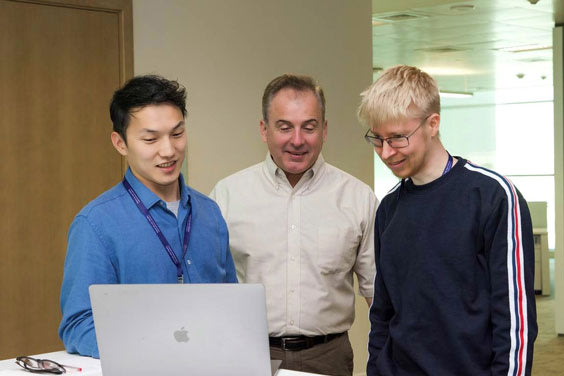

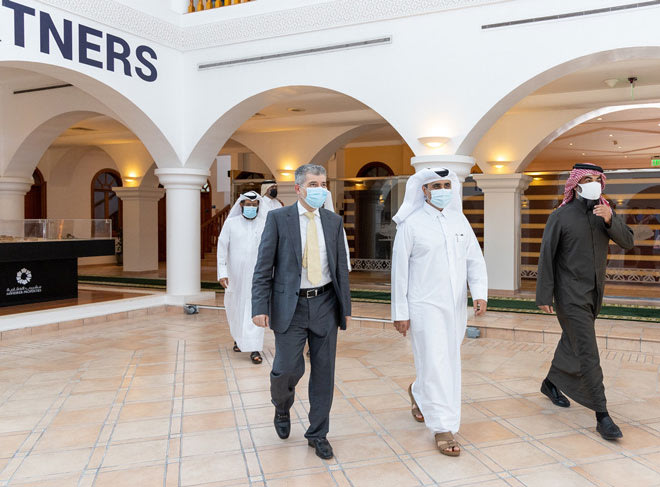
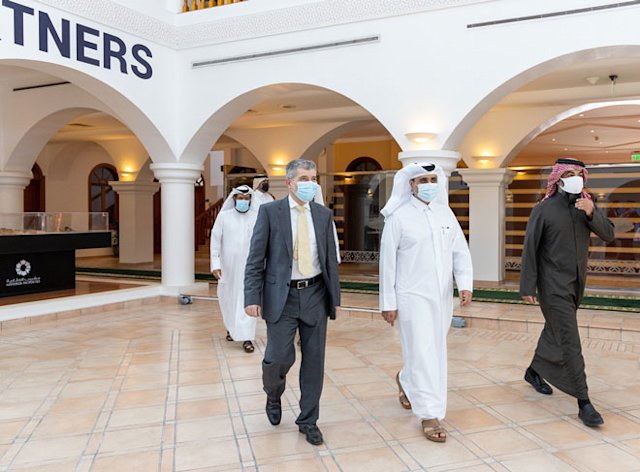
How Gifted Students Gain
Gifted students in Qatar whose learning opportunities were previously limited in Qatar – or who had to travel outside the country for their needs to be met – were given a new avenue of support in January as QF and the Johns Hopkins Center for Talented Youth (CTY) unveiled a program specifically tailored for them.
The Qatar Foundation Gifted Enrichment Programs were launched with CTY offering a customized version of its Live Interactive Virtual Explorations program, which identifies gifted learners and nurtures their talents.
CTY is regarded as a global leader in the field of gifted education, and Cynthia Lee Bolton, Head of Gifted Support at QF’s Pre-University Education, said: “At QF, we are dedicated to developing and applying innovative models and practices that can influence and continuously improve education across Qatar and the region – and the agreement with the Johns Hopkins Center for Talented Youth is an example of this commitment.”
Gifted students in Qatar whose learning opportunities were previously limited in Qatar – or who had to travel outside the country for their needs to be met – were given a new avenue of support in January as QF and the Johns Hopkins Center for Talented Youth (CTY) unveiled a program specifically tailored for them.
The Qatar Foundation Gifted Enrichment Programs were launched with CTY offering a customized version of its Live Interactive Virtual Explorations program, which identifies gifted learners and nurtures their talents.
CTY is regarded as a global leader in the field of gifted education, and Cynthia Lee Bolton, Head of Gifted Support at QF’s Pre-University Education, said: “At QF, we are dedicated to developing and applying innovative models and practices that can influence and continuously improve education across Qatar and the region – and the agreement with the Johns Hopkins Center for Talented Youth is an example of this commitment.”
We are dedicated to developing and applying innovative models and practices that can influence and continuously improve education.
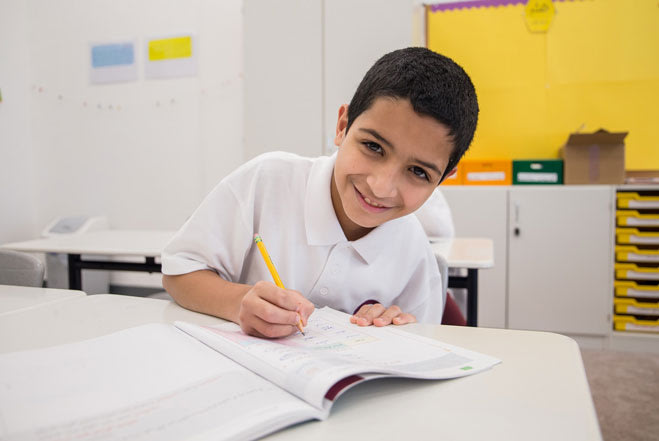
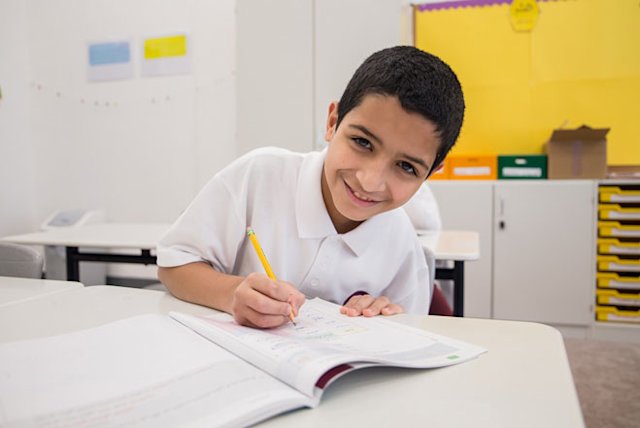
Where Voices are Heard
Within a QF school, students were both discovering their voice and how to use it, through a specially crafted course using everything from poetry to podcasts to help them recognize how they can be change-makers in their communities.
The Voice, Agency, Protect unit was created by Qatar Academy Sidra teacher Melissa Kandido, who explained: “For 16, 17-, and 18-year-old students, developing a voice, finding a voice, and figuring out what to do with that voice is incredibly important.
“This unit served as an opportunity for everyone to come together – from whatever space and time they’re in, and whatever their understanding of social movements – to have a discussion. And that discussion is important.”
Featuring guest speakers who included writers, filmmakers, and activists, the unit used social movements ranging from Black Lives Matter to protests against the Vietnam War to explore what Kandido described as “wider conceptual questions – what does it mean to have a voice, what does it mean to use it, when do you choose to use, when do you silence it, when are you silenced?”
Within a QF school, students were both discovering their voice and how to use it, through a specially crafted course using everything from poetry to podcasts to help them recognize how they can be change-makers in their communities.
The Voice, Agency, Protect unit was created by Qatar Academy Sidra teacher Melissa Kandido, who explained: “For 16, 17-, and 18-year-old students, developing a voice, finding a voice, and figuring out what to do with that voice is incredibly important.
“This unit served as an opportunity for everyone to come together – from whatever space and time they’re in, and whatever their understanding of social movements – to have a discussion. And that discussion is important.”
Featuring guest speakers who included writers, filmmakers, and activists, the unit used social movements ranging from Black Lives Matter to protests against the Vietnam War to explore what Kandido described as “wider conceptual questions – what does it mean to have a voice, what does it mean to use it, when do you choose to use, when do you silence it, when are you silenced?”
Developing a voice, finding a voice, and figuring out what to do with that voice is incredibly important.
Qatar Academy Sidra has 655 students in the 2021-22 academic year.
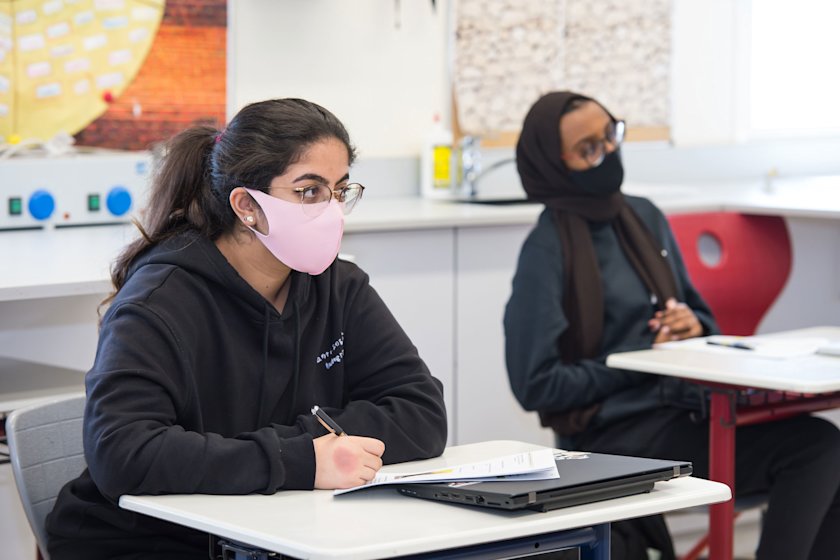
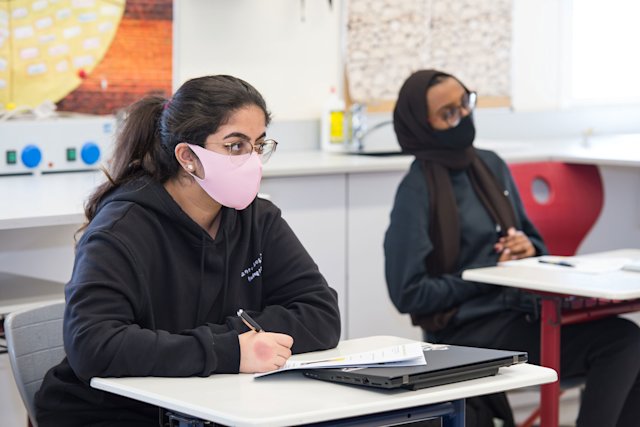
Inside a Learning Ecosystem
The voices of educators from QF emphasized the importance of inclusive, accessible education – one of the cornerstones of QF’s ethos of learning – in January as a virtual event allow parents to explore the diverse range of schools and specialized centers under its Pre-University Education (PUE) division.
As well as providing families with an insight into the personalized learning experiences that await children enrolled into QF schools, Discover PUE featured a series of sessions focusing on topics such as dual language learning, STEM and progressive education, and how parents are partners in their child’s academic journey.
And calling for a “community commitment” to protecting a child’s right to education, Matthew Campion, Principal at Renad Academy – a specialized QF school supporting children with autism – said: “Students with special educational needs have an equal right to access, and this requires a country-wide focus on raising awareness of, and understanding, these needs.
“It is vital that all students can access a full and meaningful curriculum that enables them to be challenged, to flourish, and to achieve.”
The voices of educators from QF emphasized the importance of inclusive, accessible education – one of the cornerstones of QF’s ethos of learning – in January as a virtual event allow parents to explore the diverse range of schools and specialized centers under its Pre-University Education (PUE) division.
As well as providing families with an insight into the personalized learning experiences that await children enrolled into QF schools, Discover PUE featured a series of sessions focusing on topics such as dual language learning, STEM and progressive education, and how parents are partners in their child’s academic journey.
And calling for a “community commitment” to protecting a child’s right to education, Matthew Campion, Principal at Renad Academy – a specialized QF school supporting children with autism – said: “Students with special educational needs have an equal right to access, and this requires a country-wide focus on raising awareness of, and understanding, these needs.
“It is vital that all students can access a full and meaningful curriculum that enables them to be challenged, to flourish, and to achieve.”
Students with special educational needs have an equal right to access
13 schools come under QF’s Pre-University Education.
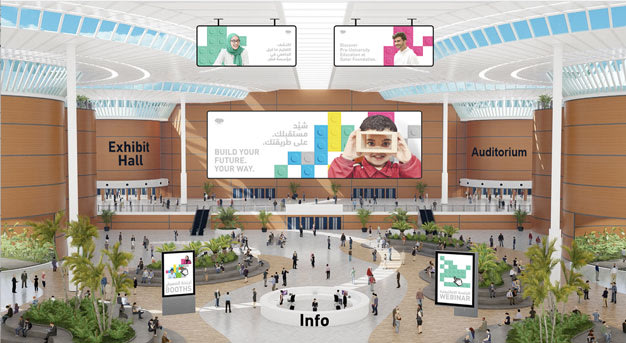

Engaging, Innovating…and Winning
Only 20 months after its opening, the QF-based first media museum in the Arab world overcame international rivals to claim a top global digital award.
The Media Majlis at QF partner university Northwestern University in Qatar – which is dedicated to exploring journalism, communication, and media, and is Qatar’s first university museum – won the Education Environments category at the 2020 Digital Signage Expo APEX Awards, which recognize excellence in using digital displays and interactive elements to engage visitors and viewers. It was up against contenders including the Bill & Melinda Gates Center for Computer Science & Engineering.
And following a transformation project, Northwestern Qatar’s Media Innovation Lab was reborn as the DAMA (Digital Advancement and Media Applications) Lab, where designers, journalists, researchers, students, and educators work together on experiments in storytelling and research.
As Eric Espig, Creative Digital Media Specialist at the university, explained, the DAMA Lab is designed to ��“create awareness and advocate for technology and innovation outside Northwestern Qatar, and bring that into the school”.
Only 20 months after its opening, the QF-based first media museum in the Arab world overcame international rivals to claim a top global digital award.
The Media Majlis at QF partner university Northwestern University in Qatar – which is dedicated to exploring journalism, communication, and media, and is Qatar’s first university museum – won the Education Environments category at the 2020 Digital Signage Expo APEX Awards, which recognize excellence in using digital displays and interactive elements to engage visitors and viewers. It was up against contenders including the Bill & Melinda Gates Center for Computer Science & Engineering.
And following a transformation project, Northwestern Qatar’s Media Innovation Lab was reborn as the DAMA (Digital Advancement and Media Applications) Lab, where designers, journalists, researchers, students, and educators work together on experiments in storytelling and research.
As Eric Espig, Creative Digital Media Specialist at the university, explained, the DAMA Lab is designed to “create awareness and advocate for technology and innovation outside Northwestern Qatar, and bring that into the school”.
Northwestern Qatar’s Media Majlis explores
- Journalism
- Communication
- Media
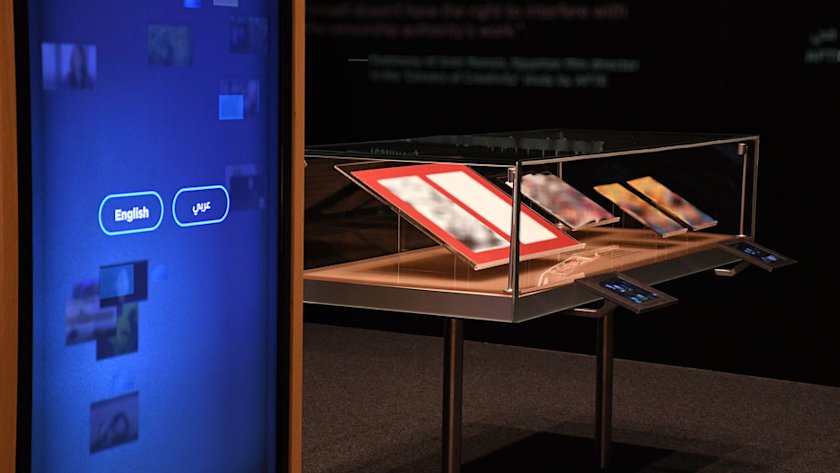
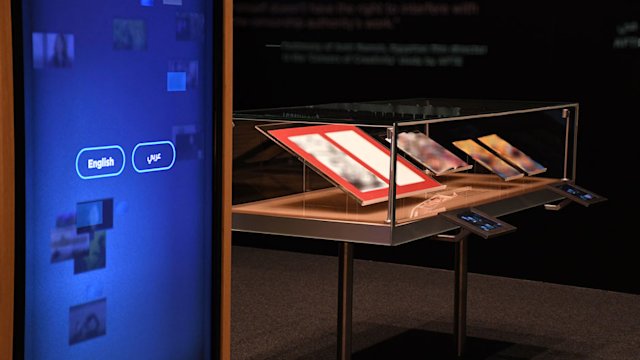
The Education Environments award at the 2020 #DSFAwards goes to @MOSECOQatar for MEDIA MAJLIS at Northwestern University Qatar. Congrats! pic.twitter.com/S2blkyCslk
— DSFederation (@DSFederation) January 13, 2021
The Business of Knowledge
An innovative approach to learning was also introduced at another QF partner university – in the form of a coffee shop with a difference.
Rather than serving up espressos and lattes, the Data Viz Café was created by Georgetown University in Qatar as a fictitious company website designed to help international affairs students learn about data visualization and data analytics, and why they are key to decision making.
By analyzing the coffee shop’s transactions, the students learn how data helps private sector companies gain a competitive edge, with course instructor Robert Laws explaining: “Having a data set of over 230,000 individual order records is overwhelming to parse on its own – that’s where software and data analytics come in to save the day.
“Students learn how to approach the coffee shop’s data with a flexible perspective, and discover the best way to visualize the data to tell the right story.”
An innovative approach to learning was also introduced at another QF partner university – in the form of a coffee shop with a difference.
Rather than serving up espressos and lattes, the Data Viz Café was created by Georgetown University in Qatar as a fictitious company website designed to help international affairs students learn about data visualization and data analytics, and why they are key to decision making.
By analyzing the coffee shop’s transactions, the students learn how data helps private sector companies gain a competitive edge, with course instructor Robert Laws explaining: “Having a data set of over 230,000 individual order records is overwhelming to parse on its own – that’s where software and data analytics come in to save the day.
“Students learn how to approach the coffee shop’s data with a flexible perspective, and discover the best way to visualize the data to tell the right story.”
GU-Q’s Bachelor of Science in Foreign Service offers majors in:
- Culture and Politics
- International Economics
- International History
- International Politics
A Critical Eye
Islam, social media, and COVID-19 – all three subjects were brought together in one place by a HBKU college in January, to be discussed by social media users, influencers, thinkers, and scholars from Muslim communities around the world.
#IslamGenZ, organized by the College of Islamic Studies, addressed the use of social media by Muslims, including during the pandemic, and its effect on Muslim youth, with guest experts including award-winning Syrian-American poet Amal Kassir; best-selling author and interfaith activist Dr. Craig Considine; and Dr. Khaled Beydoun, a leading scholar on Islamophobia.
“Given the current challenges, especially while social media continues to become an integral part of our lives, we are duty bound as an academic institution to turn a critical eye to what influence it is having on young Muslims and, in turn, the role they are playing,” said Dr. Evren Tok, Associate Professor and Assistant Dean of Innovation and Community Engagement, HBKU.
Islam, social media, and COVID-19 – all three subjects were brought together in one place by a HBKU college in January, to be discussed by social media users, influencers, thinkers, and scholars from Muslim communities around the world.
#IslamGenZ, organized by the College of Islamic Studies, addressed the use of social media by Muslims, including during the pandemic, and its effect on Muslim youth, with guest experts including award-winning Syrian-American poet Amal Kassir; best-selling author and interfaith activist Dr. Craig Considine; and Dr. Khaled Beydoun, a leading scholar on Islamophobia.
“Given the current challenges, especially while social media continues to become an integral part of our lives, we are duty bound as an academic institution to turn a critical eye to what influence it is having on young Muslims and, in turn, the role they are playing,” said Dr. Evren Tok, Associate Professor and Assistant Dean of Innovation and Community Engagement, HBKU.
The College of Islamic Studies has 6 graduate programs
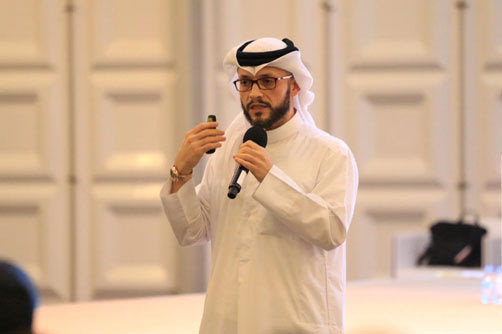

Why should Christians defend the honor of Prophet Muhammad?
— Dr. Craig Considine (@CraigCons) January 26, 2021
I’ll answer this question in the upcoming #IslamGenZ webinar organized by the College of Islamic Studies at @HBKU.
I wrote “The Humanity of Muhammad” to defend his honor. Why do you think Christians should defend him? pic.twitter.com/XedxGetxGF
Open to Everyone
QF’s Education City is an open, diverse, and vibrant environment; a hub of community life. January re-emphasized this – in the form of partnership, and digitization.
Products handmade by children at the Orphan Care Center ‘Dreama’ went on display at the Education City Gift Shop, giving them an outlet for their creativity. A similar collaboration between the Gift Shop and the Protection and Social Rehabilitation Centre (AMAN) would follow later in the year, adding to those with the Shafallah Centre for Children with Disabilities and the Ministry of Interior.
And a new way of exploring and experiencing Education City – by bringing it together in a single digital location - was opened up the community with the launch of the free-to-download Education City App.
“Everything that QF offers at Education City is designed to leave a lasting, positive, and empowering mark on people’s lives,” said Machaille Hassan Al-Naimi, President of Community Development, QF.
“Through the Education City App and its accompanying digital platforms, we look forward to welcoming even more people to Education City, and inviting them to discover how our home is a destination for everyone.”
QF’s Education City is an open, diverse, and vibrant environment; a hub of community life. January re-emphasized this – in the form of partnership, and digitization.
Products handmade by children at the Orphan Care Center ‘Dreama’ went on display at the Education City Gift Shop, giving them an outlet for their creativity. A similar collaboration between the Gift Shop and the Protection and Social Rehabilitation Centre (AMAN) would follow later in the year, adding to those with the Shafallah Centre for Children with Disabilities and the Ministry of Interior.
And a new way of exploring and experiencing Education City – by bringing it together in a single digital location - was opened up the community with the launch of the free-to-download Education City App.
“Everything that QF offers at Education City is designed to leave a lasting, positive, and empowering mark on people’s lives,” said Machaille Hassan Al-Naimi, President of Community Development, QF.
“Through the Education City App and its accompanying digital platforms, we look forward to welcoming even more people to Education City, and inviting them to discover how our home is a destination for everyone.”
Everything that QF offers at Education City is designed to leave a lasting, positive, and empowering mark on people’s lives
The Education City App is:
- Fully accessible and MADA accredited
- Designed by a QF alumni-owned company
- Dual language (Arabic and English)
- Available for free from Google Play and the Apple Store